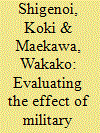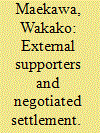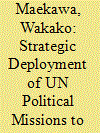| Srl | Item |
| 1 |
ID:
186972


|
|
|
|
|
| Summary/Abstract |
This article examines the effect of foreign military intervention on rebel governance in terms of disaggregated human security. Case studies reveal that, on the one hand, a ‘thirst for legitimacy’ influenced by military intervention has led rebel groups to engage in internal and external diplomatic activities. Moreover, their efforts to develop fundamental rebel governance structures have had clearly positive effects on human security. On the other hand, when repelled from a territory by military interventions, rebel groups have attempted to control their remaining territories through the imposition of fear, which can devastate human security in rebel-held areas.
|
|
|
|
|
|
|
|
|
|
|
|
|
|
|
|
| 2 |
ID:
164168


|
|
|
|
|
| Summary/Abstract |
External supporters have heterogeneous preferences over civil war outcomes depending on the issues at stake. In this article, the bargaining model and empirical study show that such preferences of external supporters need to be considered not only when analyzing the causes of support but also when analyzing how they affect a conflict. By adding an external supporter to a traditional conflict bargaining model as a strategic actor who receives a payoff from the political division, this article investigates how the preferences of external supporters influence the likelihood of a peace agreement in civil wars over a government. I demonstrate that a peace agreement is more likely to happen when the external supporters of the government side are not satisfied with the current political status quo of the supported state. The empirical analysis of political civil wars from 1976 to 2009 supports the implications of the bargaining model.
|
|
|
|
|
|
|
|
|
|
|
|
|
|
|
|
| 3 |
ID:
189898


|
|
|
|
|
| Summary/Abstract |
Although United Nations peacekeeping operations (UN PKOs) produce positive outcomes for peace, some missions are strategically replaced by cheaper and smaller UN political missions (PMs). This article explores why certain peacekeepers are replaced by UN PMs and unpacks the exit strategy of UN PKOs. The logic of demand-side and supply-side perspectives is evaluated using data on the deployment of UN peacekeepers and UN PMs in post-civil war countries between 1993 and 2016. Signing comprehensive peace agreements (CPAs) increases the chances of UN PKOs being replaced by UN PMs because as the willingness to develop politically increases, the demand for civilian personnel after demilitarization also rises. On the supply side, as the preferences of the five permanent members of the UN Security Council concerning target states become more heterogenous, UN PKOs are more likely to be replaced by UN PMs because coordination problems encourage members to choose less burdensome missions.
|
|
|
|
|
|
|
|
|
|
|
|
|
|
|
|